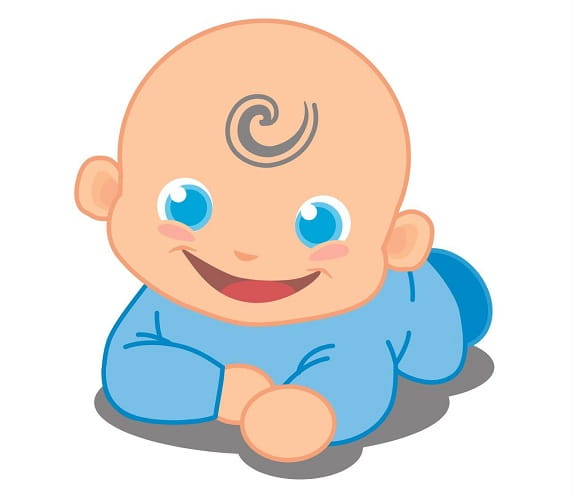So the second month is behind you. Time really flies, doesn’t it? You have already developed some routine and you and your baby started to understand each other a bit better. So, will third month bring something new? Find out what changes will you face in the third month with a newborn
If you’re just starting with parenting and you’re facing the “critical” first month, we suggest you start with handling the baby in its first month where we started this “New parent challenges” saga.
Importance of tummy time
Let’s start with the dreaded tummy time! Is there a baby who enjoys it? And yet, you know how important it is to exercise those little neck muscles. At 3 months, a baby should spend at least 20 minutes daily on his/her tummy. Easier said than done! Trying to lift their head is really hard for babies – it’s still very big compared to their body! You can see how much they are struggling to keep balance. Not only is this position quite uncomfortable, it’s also unfamiliar.
Tummy time as a term is quite a new phenomenon. Parents used to put their babies to sleep on their tummy because they feared child could choke on their back. They were on tummy a lot, so there wasn’t a need for dedicated tummy time. But sleeping on the tummy proved unsafe and the “back to sleep” campaign advised parents to put children on their backs to sleep to avoid SIDS (Sudden infant death syndrome). Today, children are mostly on their backs (they do sleep a lot!), so it’s important to keep track of their tummy time.
But why is that important? Motor skills develop rapidly during the first year of life and they do so in certain order. You can’t walk before you crawl – although there are some exceptions. Head control is one of the most foundational milestones of the motor development. With proper head control, a child can learn how to roll, sit and eventually crawl and walk. Being on the tummy allows baby to experiment with new types of movements. First, there will be turning head from side to side, then lifting the head, then supporting with arms and lifting the whole chest… As with every skill, you must practice a lot to become a master.
If baby doesn’t like being on the tummy there are certain things you could try. First, try to limit duration. Make it gradual – everyone needs time to adjust to the new sensations. First weeks 1-2 minutes per day are great! Don’t try to do a tummy time when the baby is hungry, tired or upset. Also, wait for some time after the meal. If a baby is protesting, try to amuse her with rattles and toys, or even better, join her on the floor! If she is crying, pick her up and comfort her – you want to keep this a positive experience. With time, the baby will be able to stay on her tummy longer and hopefully even enjoy it.
Oral stage and mouth exploration
You probably noticed from the day one that your little one really likes to put things in its mouth. But you only needed a breast, bottle or pacifier to keep him/her satisfied. But as the time goes, and your baby finds out that hands are something it can control, get ready for more stuff ending up in its mouth.
Oral stage of development was first defined by Sigmund Freud and his psychoanalysis theory.
The theory says that every person goes through 5 psychosexual development stages where the oral stage is the first one.
Oral stage lasts mostly from birth to the age of 18 months. We won’t focus too much on psychosexual development here, but it’s important to notice that oral phase is here to stay for quite some time.
As your child develops oculomotor coordination, everything it grabs will end up in its mouth eventually. So why is that? As we mentioned earlier, almost everything is still new to your child and it needs to explore those strange new things. Texture, shape, smell, taste – so many interesting properties! But it’s tactile receptors on hands are still not as developed as its mouth receptors. So putting things in the mouth lets your baby explore things to its fullest.
Another reason is emotional regulation. Your baby calms itself by putting things in its mouth and you probably know this after the first two months. That’s why pacifiers work so great – because the act of sucking calms down the baby. If your child doesn’t use a pacifier, it will find another way to soothe itself – probably by sucking its hand.
The third reason can be teeth growth. The first tooth emerges at 6 months on average, but for some children, it can be much sooner, even at 3 months. If that is the case, expect edginess, irritability, drooling and a lot of chewing from your little cupcake.
So now you know that putting things in the mouth is perfectly normal although annoying most of the times: There will be saliva everywhere, unpleasant sounds and obsessive behavior in your baby but bear with it. It should pass. I hope so. In our baby girl, it’s in full swing! Just watch out for dirty or small things so they don’t find the way in the baby’s mouth. And prepare a lot of tissues for the drooling And I mean A LOT!
More awareness = More interactions
One other big change you will notice in the third month of baby’s life is that it’s seeking a lot more attention and playtime. As the baby becomes more aware of its surroundings, it will become fascinated by new visual/auditory/tactile inputs.
As the sight improves, you’ll notice that your baby is staring at the new things it sees in the environment, especially some patterns like shadows on the wall or sources of light. Also, it will start noticing a television and that can be a good attention grabber (although not a recommended one). Who would have known that our little girl really likes to watch Ted-Ed, good for her!
One other thing that we finally put to good use is our homemade sensory bottle. Our daughter really started to appreciate and enjoy its effects and playing with it can really grab her attention.
The same thing with sounds. You’ll learn what music your baby likes and what isn’t it’s cup of tea. Of course, the sound of its parent’s voice is the most preferred sound so talk to your baby and sing a lot. Even if you’re not so talented, you just found the biggest fan of your singing. And that means something!
Also, try to avoid loud and sudden noises because you risk some intense reactions. Your child is developing the sense of fear and there are no worse things than sudden and loud noises. And roleplaying with different toys and mimicking different voices can really bring out some laughs from your baby. And by laugh, I mean real Laugh out Loud. And it is quite the experience when you hear it for the first time, believe me!
With all the visual and auditory interaction, don’t forget about tactile stimulation and play. You probably already have a full house of toys made out of different materials. So why not put them to good use. Remember that your baby still takes most of the information from touch. So let it feel different objects on its skin, in hand and inevitably in its mouth.
So these are the biggest changes we noticed in the third month of our child’s life. There is a ton of other stuff like constantly finding new methods to keep your child satisfied because new effective strategies come and go (and sometimes come back), but we already talked about it in the second month of child life so nothing changed on that field.
Hope you found this short overview helpful and we would really like to hear about your experiences, challenges and how did you cope with them.
In the next month, the second round of vaccination is coming so stay tuned for the fourth month and challenges it will bring.
If you’re searching for some great STEM Activities for Kids and Child development tips, you’re in the right place! Check the Categories below to find the right activity for you.








2 thoughts on “What to expect from newborn in the Third month”